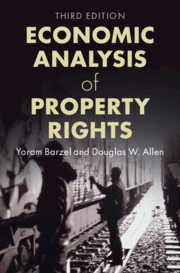Crossref Citations
This Book has been
cited by the following publications. This list is generated based on data provided by Crossref.
Rimoli, Richard
Nichiforel, Liviu
Acharya, Aditya
Nollet, Alexandre
Snoussi, Bilal
Ambroise, Lison
Cordonnier, Louis
Mares, Sandra Galván
Zúñiga, José Jonathan Aguirre
Bontemps, Jean-Daniel
and
Bouriaud, Laura
2023.
The Property Rights Index (PRIF) can be used worldwide to compare different forest governance systems.
Scientific Reports,
Vol. 13,
Issue. 1,
Liu, Yuanfeng
and
He, Xinyuan
2023.
Unraveling the Institutional Logic in China: an Examination of the Institutional Logic Behind Separation of Ownership, Contract Rights, and Operational Rights.
Journal of the Knowledge Economy,
Vol. 15,
Issue. 3,
p.
13509.
Sichelman, Ted
and
Smith, Henry E.
2024.
A network model of legal relations.
Philosophical Transactions of the Royal Society A: Mathematical, Physical and Engineering Sciences,
Vol. 382,
Issue. 2270,
Li, Heran
Abbas, Qamar
Ramzan, Muhammad
and
Fatima, Sumbal
2024.
Impact of Domestic Investment on Domestic Credit Level. Does Institutional Quality Matter?.
Journal of the Knowledge Economy,
Lana Berasain, José-Miguel
2024.
Between a rock and a hard place: the privatization or preservation of the commons in Spain in the long 19th century.
Zeitschrift für Rechtssoziologie,
Vol. 44,
Issue. 2,
p.
295.
Allen, Douglas W.
2024.
Yoram Barzel: commemorating the life of an institutional economist.
Journal of Institutional Economics,
Vol. 20,
Issue. ,
Deng, Jie
Liu, Hao
Yu, Huaibing
and
Chen, Zonghao
2024.
Cash flow uncertainty, ownership structure and corporate real estate holding.
Applied Economics,
p.
1.
Hodgson, Geoffrey M.
2024.
It Does Exactly what it Says on its Cover: Commons’s
Legal Foundations
as an Inspirational Text for Legal Institutionalism
.
Journal of Economic Issues,
Vol. 58,
Issue. 4,
p.
1096.
Holzhacker, Martin
Loch, Harlow
Miller, Jason
and
Scott, Alex
2024.
Property Rights Restrictions and Self-Employed Workers: Evidence From For-Hire Owner–Operators in U.S. Trucking.
Production and Operations Management,
Fan, Xiujuan
2024.
Application of econometric modeling to the impact of cultural industry policies.
Applied Mathematics and Nonlinear Sciences,
Vol. 9,
Issue. 1,
Guangqing, Zhang
2024.
The Risk Impact of Rural Land Mortgage Loans in China From the Perspective of Sustainable Development.
SSRN Electronic Journal,
Jheng, Shao‐yu
Koo, Hui‐wen
and
Wu, Kun‐jung
2024.
Property rights in a weak state: Evidence from land pawning in Qing Taiwan (1683–1895).
Asia‐Pacific Economic History Review,
Vol. 64,
Issue. 2,
p.
213.
Kulpa, Travis
Miller, Jason W.
and
Thomas, Rodney
2024.
Investigating the dynamic and contingent effects of the US import air freight market throughout the phases of the COVID‐19 disruption.
Transportation Journal,
Vol. 63,
Issue. 3,
p.
156.
Hodgson, Geoffrey M.
2025.
Formal and informal institutions: some problems of meaning, impact, and interaction.
Journal of Institutional Economics,
Vol. 21,
Issue. ,
Alston, Lee J.
and
Mueller, Bernardo
2025.
Handbook of New Institutional Economics.
p.
319.
Weng, Yiqing
and
Wang, Shuifu
2025.
Perception of land rights, village industrial development, and household entrepreneurial behavior—evidence from non-farm entrepreneurship in rural China.
Frontiers in Sustainable Food Systems,
Vol. 8,
Issue. ,
Chen, Haining
Wang, Jianguo
Han, Tianran
and
Jin, Xin
2025.
Organic renewal of property plots in Chinese cities: Sustainable development of built environment via property value enhancement and digital twin construction.
Indoor and Built Environment,
Vol. 34,
Issue. 1,
p.
7.



